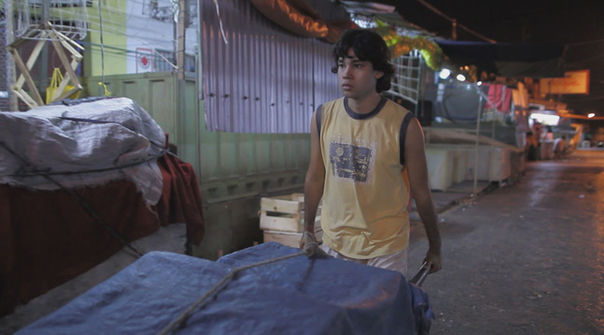Seven boxes for a Guarani dream
Marianela González of the 2013 Guadalajara Talent Press reviews Juan Carlos Maneglia's and Tana Schembori's 7 CAJAS.

Juan Carlos Maneglia's and Tana Schembori's 7 CAJAS.
Now I can lie back in my seat, I’m definitely staying to watch this film. It is called 7 CAJAS and it is the most popular film in the history of Cinema of Paraguay. In a working class market in Asunción, a young man is obsessed with a cell phone which can record video. A first shot tells me that he is broke; he doesn't have a local cent, which is less than a penny. He speaks a mix of Spanish and Guarani; however, when he gets excited Tupá comes out of his mouth.
People use to say the real problem started five hundred years back and it ended up two centuries ago. We even celebrated the Bicentenary with fireworks, sprees, carnivals, and political speeches; furthermore, we build monuments as the one that stands next to the remains of an Aztec city. We celebrated that we stopped being naïve, we don't exchange our culture for pocket mirrors even though we don't have one to look at ourselves or to cast our light to the world.
Victor pushes his only belonging through the markets in Paraguay: a wheelbarrow to carry other people's belongings. His skin is dark, his language skills are reduced; his presence is tiny beneath the sunshades of the stalls, he is just an ant in a market swarming with peddlers, purchasers, local policemen, transvestites, and Korean immigrants; everyone bumping into one another due to the reduced street which leads to the police station. Victor, the young Guarani, needs attention. He wants to see himself in the small and big plasma screens which give form to this world: modern mirrors. If no one can see you it is because you don't exist.
The structure chosen by the filmmakers of this film is a linear narration, sometimes static, sometimes repetitive between a déjà vu of persecution sequences, like a video game. The shots and the placement of the cameras during the wheelbarrow races are always in front of the character, aerial shots allow us to locate subjects, just as in a commando video game, designed to make us feel that the character in front of the camera is ourself, the gamer. Even though we don't look like Victor and we don't speak Guarani.
However, it seems that the only credible characters of the movie are the ones who look like the lead character, the ones that have a similar object of desire. The scriptwriters will only let us go deeper into the lives of the aforementioned characters, their shades, their psychological elements and human conflicts: even Victor's sister, Victor's friend and a Korean immigrant get to experience their own development in 7 CAJAS. On the other hand, the antagonists are extremely caricaturized, their makeup is untidy and their costumes are badly sewn. As if the intention was to remind us that the representation on screen (the things that "exist") has no shades: Who are they? What is their motive? Those questions will not be answered in a news broadcast, nor in a video game, just as it happens when the characters look at themselves at the mirror. None of these characters has seen itself in a screen; unfortunately, they will never get to do it.
The filmmakers have given Victor a chance; he has deserved it because he has looked above the sunshades, beyond the cartoon. But he won't have the strength, eventually he will return to the land of the blind and he will become invisible again. What should he do? Abandon the game? Continue playing? He will reach the final level, where he faces the monster. His dream is too big to fit in seven boxes.
We shall celebrate! Two hundred years ago we achieved our freedom on this side of the Atlantic! Let’s erect another obelisk. Or shall we make a film? A film which can be screened at festivals, a film that can be loaded at YouTube… Let the whole world put its eyes on us!

